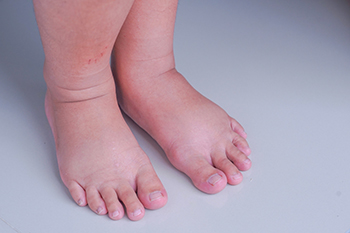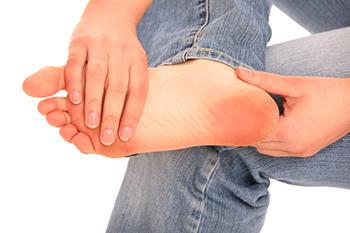Connect With Us
Blog
Items filtered by date: March 2023
Signs of an Ingrown Toenail

There are a variety of nail diseases that impact the health, strength, and appearance of toenails. An ingrown toenail is when the toenail grows into the surrounding skin. It can cause pain and swelling, and in some cases, it can become infected. Causes of ingrown toenails include having a genetic predisposition for them, cutting the toenails wrong, and wearing tight shoes or socks. Sometimes relief for an ingrown toenail can be found by soaking the nail in warm water three to four times a day and wearing comfortable shoes. If you have an ingrown toenail, and especially if you notice that is infected or oozing pus, it is suggested that you see a podiatrist for treatment.
Ingrown toenails may initially present themselves as a minor discomfort, but they may progress into an infection in the skin without proper treatment. For more information about ingrown toenails, contact one of our podiatrists of American Surgeons Group. Our practitioners can provide the care you need to keep you pain-free and on your feet.
Ingrown Toenails
Ingrown toenails are caused when the corner or side of a toenail grows into the soft flesh surrounding it. They often result in redness, swelling, pain, and in some cases, infection. This condition typically affects the big toe and may recur if it is not treated properly.
Causes
- Improper toenail trimming
- Genetics
- Improper shoe fitting
- Injury from pedicures or nail picking
- Abnormal gait
- Poor hygiene
You are more likely to develop an ingrown toenail if you are obese, have diabetes, arthritis, or have any fungal infection in your nails. Additionally, people who have foot or toe deformities are at a higher risk of developing an ingrown toenail.
Symptoms
Some symptoms of ingrown toenails are redness, swelling, and pain. In rare cases, there may be a yellowish drainage coming from the nail.
Treatment
Ignoring an ingrown toenail can have serious complications. Infections of the nail border can progress to a deeper soft-tissue infection, which can then turn into a bone infection. You should always speak with your podiatrist if you suspect you have an ingrown toenail, especially if you have diabetes or poor circulation.
If you have any questions, please feel free to contact our offices located in Homewood, South Chicago Heights, and Mokena, IL . We offer the newest diagnostic and treatment technologies for all your foot care needs.
History of Flip-Flops

Flip-flops are notoriously a potentially detrimental type of footwear that can wreak havoc on the health of an individual’s feet. Flip-flops were originally created to be only a summer-time shoe, used for beachwear. The name “flip-flops” became popularized in the 1950s. Since this time, flip-flops have grown in popularity and the shoe has been used outside of the beach context. Unfortunately, flip-flops do not provide significant foot support, which can essentially set the foot up for the development of a foot condition or affliction. Since the toes must scrunch up to keep the shoe on the foot, this can also set the foot up for the onset of a foot condition. If you wear flip-flops, it is suggested that you contact a podiatrist today for more information.
Flip-flops are not always the best choice of footwear. If you have any concerns about your feet or ankles, contact one of our podiatrists from American Surgeons Group. Our practitioners will assist you with all of your foot and ankle needs.
Flip-Flops and Feet
When the weather starts warming up, people enjoy wearing flip-flops. Flip-flops are comfortable, stylish, and easy to slip on and off; they're perfect for any summer beach goer. However, these shoes can cause harm to the feet.
How Can Flip-Flops Affect Me Long-Term?
- Ankle problems
- Hip problems
- Lower back problems
- Pain in the balls of the feet
- Problems with foot arches
- Changes in the way you walk
Are There Injuries Associated with Flip-Flops?
Yes. Since flip-flops are relatively weak and do not provide the same amount of support as sneakers, people who wear flip-flops regularly are more susceptible to injuries. On top of that, the open nature of the shoe makes your feet more prone to other problems, such as cuts and even infections. Common injuries and ailments include:
- Sprained ankles
- Blisters
- Infections
- Cuts and Scrapes
I like Wearing Flip-Flops. Are There Safe Alternatives?
When buying flip-flops, try to find ones that have sturdy soles and that are made of high-quality materials that will support for your feet. These flip-flops will cost more but will also last longer as a result.
If you have any questions please feel free to contact our offices located in Homewood, South Chicago Heights, and Mokena, IL . We offer the newest diagnostic and treatment technologies for all your foot and ankle needs.
Ankle Fracture? Don’t Wait for Treatment
Why Are My Feet and Ankles Swollen?

The feet and ankles are likely areas where excess fluid in the body can accumulate. The medical term for this is called edema, and swelling of the feet is a common condition. This swelling can occur for various reasons, including obesity, eating foods that are salty, and taking certain medications. Additionally, many pregnant women suffer from swollen feet and ankles, and this is a normal part of pregnancy. Swollen feet may also happen due to an allergic reaction, such as an insect bite or sting, or from an ankle injury. It is possible that swollen feet can be reduced by limiting sodium intake, gently stretching and exercising, and frequently elevating the feet. It can be beneficial to sit for short periods of time with the feet elevated and to wear shoes that fit correctly. If you have swollen feet or ankles, it is suggested that you speak with a podiatrist who can determine what the reason is and provide treatment solutions.
Swollen feet can be a sign of an underlying condition. If you have any concerns, contact one of our podiatrists of American Surgeons Group. Our practitioners can provide the care you need to keep you pain-free and on your feet.
Swollen feet are a common ailment among pregnant women and people who stand or sit for extended periods. Aging may increase the possibility of swollen feet and patients who are obese often notice when their feet are swelling too. There may be medical reasons why swollen feet occur:
- Phlebitis - A condition that causes the veins to become inflamed and can also cause leg pain.
- Liver disease - This may lead to low blood levels of albumin which is a protein. This can cause fluid in the blood to pass into the tissues and several areas of the body can become swollen.
- Heart failure - When the heart doesn’t pump properly the blood that is normally pumped back to the heart can pool in the veins of the legs causing swollen feet.
- Kidney disease - One of the main functions of the kidneys is releasing excess fluid in the body. This type of condition can make it difficult for the kidneys to function properly, and as a result the feet may become swollen.
- Deep-vein thrombosis (DVT)- This is a serious condition where blood clots form in the veins of the legs. They can block the return of blood from the legs to the heart which may cause the feet to swell. It is important to be treated by a podiatrist if this condition is present.
Swollen feet can also be caused by bone and tendon conditions, including fractures, arthritis, and tendinitis. Additionally, there may be skin and toenail conditions and an infection may cause the feet to swell. Patients who take medicine to treat high blood pressure may be prone to getting swollen feet.
Many patients elevate their feet to help relieve the swelling and this is generally a temporary remedy. When a podiatrist is consulted the reason behind the swelling can be uncovered and subsequently treated.
If you have any questions please feel free to contact our offices located in Homewood, South Chicago Heights, and Mokena, IL . We offer the newest diagnostic tools and technology to treat your foot and ankle needs.
Foot Pain From Walking on the Beach

The beach is undoubtedly a very popular vacation destination for many different individuals. Many people look forward to getting the chance to walk on the beach and feel the sand between their toes during beach vacations. However, if an individual is walking significantly long distances on the beach without wearing any shoes, this might lead to foot pain. In other words, not wearing proper footwear during long walks on the beach might contribute to strains and injuries in the feet. If you are only walking a short distance, however, it might not always be necessary to wear footwear. If you are walking barefoot on the beach, you might also be especially mindful of protecting your feet from debris and objects like shells and broken glass. If you want to learn more about protecting your feet on the beach, it is suggested that you contact a podiatrist today.
Foot Pain
Foot pain can be extremely painful and debilitating. If you have a foot pain, consult with one of our podiatrists from American Surgeons Group. Our practitioners will assess your condition and provide you with quality foot and ankle treatment.
Causes
Foot pain is a very broad condition that could be caused by one or more ailments. The most common include:
- Bunions
- Hammertoes
- Plantar Fasciitis
- Bone Spurs
- Corns
- Tarsal Tunnel Syndrome
- Ingrown Toenails
- Arthritis (such as Gout, Rheumatoid, and Osteoarthritis)
- Flat Feet
- Injury (from stress fractures, broken toe, foot, ankle, Achilles tendon ruptures, and sprains)
- And more
Diagnosis
To figure out the cause of foot pain, podiatrists utilize several different methods. This can range from simple visual inspections and sensation tests to X-rays and MRI scans. Prior medical history, family medical history, and any recent physical traumatic events will all be taken into consideration for a proper diagnosis.
Treatment
Treatment depends upon the cause of the foot pain. Whether it is resting, staying off the foot, or having surgery; podiatrists have a number of treatment options available for foot pain.
If you have any questions, please feel free to contact our offices located in Homewood, South Chicago Heights, and Mokena, IL . We offer the newest diagnostic and treatment technologies for all your foot care needs.

